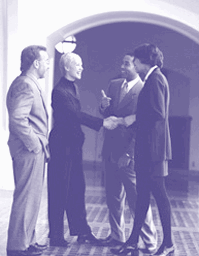
Joe's Law of 250
| Продажи | ||||
| Sales.com | ||||
| Keeping... | ||||
by Graham Denton
If you're ever tempted to think that one dissatisfied customer doesn't matter, take a tip from Detroit Chevy salesman Joe Girard. Back in the 1970s, Joe was named by the Guinness Book of Records as the world's greatest salesman, and one reason for his success was word-of-mouth advertising. The reason that word-of-mouth worked so well for him-in a selling career where he averaged two cars every day - is that he always respected what he called Girard's Law of 250.
 Shortly
after he got into the car business, Joe recalls in his autobiography How
to Sell Anything to Anybody, he went to a Catholic funeral to pay
his respects. As at many Catholic wakes, the funeral home handed out little
memorial cards-they're called "mass cards"-to the visitors, and it occurred
to Joe to investigate that practice. "How do you know how many of these
to print?" he asked the funeral director. By long experience, the director
responded, we know that the average number of people who come to a funeral
is 250. So that's how many mass cards we make up.
Shortly
after he got into the car business, Joe recalls in his autobiography How
to Sell Anything to Anybody, he went to a Catholic funeral to pay
his respects. As at many Catholic wakes, the funeral home handed out little
memorial cards-they're called "mass cards"-to the visitors, and it occurred
to Joe to investigate that practice. "How do you know how many of these
to print?" he asked the funeral director. By long experience, the director
responded, we know that the average number of people who come to a funeral
is 250. So that's how many mass cards we make up.
Finding himself at a Protestant funeral a short time later, Joe asked the funeral director there about his attendance figures, and was told exactly the same number-250. Then, at a wedding, he chatted with the caterers about their experiences. "How many people on average come to a wedding?" The answer was 500-about roughly split, with 250 on the groom's side and 250 on the bride's. So, reasoning that three was the statistical charm, Joe came up with his Law of 250: "Everybody knows 250 people in his or her life important enough to invite to the wedding and to the funeral."
This is an average, of course, and open to quibbling. But the point that Joe is making goes beyond statistics. It's that every time you interact with a prospect or customer, there's the potential for your name to become known-for good or for ill-to 250 other people. That's a tremendous opportunity, and a tremendous threat. If you treat a customer well and he tells his friends, you've got potentially 250 new eager prospects, that is, 250 people who, because of your good handling of their friend, might be interested in doing business with you.
If you treat that customer poorly, on the other hand, you've just created a monster with 250 heads. If you tick even one person off, and that person tells friends (and customers whom you displease will always tell their friends), and those friends tell their friends, then within a matter of months you've created a huge community of people who believe it's in their best interest to keep away from you.
Joe draws a practical moral from his survey. It relates to the obvious fact that people talk about their purchases-and about the salespeople who have "helped" them to buy. "People talk a lot to other people about what they buy and what they plan to buy. Others are always offering advice about where to buy what and how much to pay. That's a big part of the everyday life of ordinary people.
"Can you afford to jeopardize just one of those people? I can't."